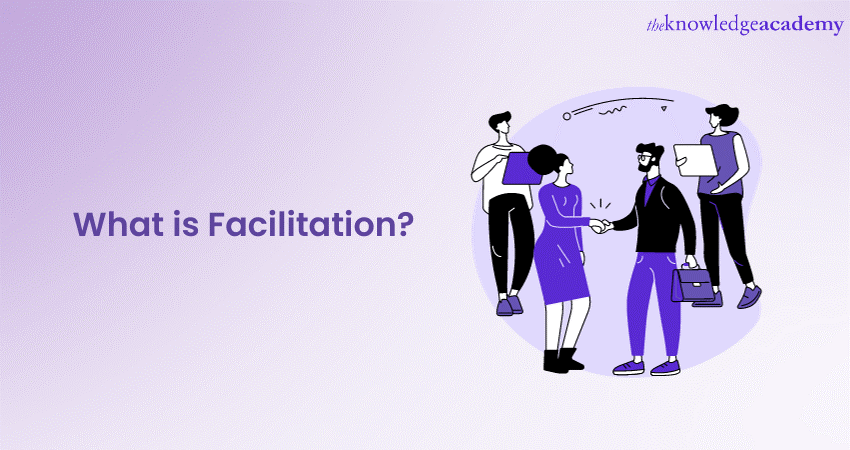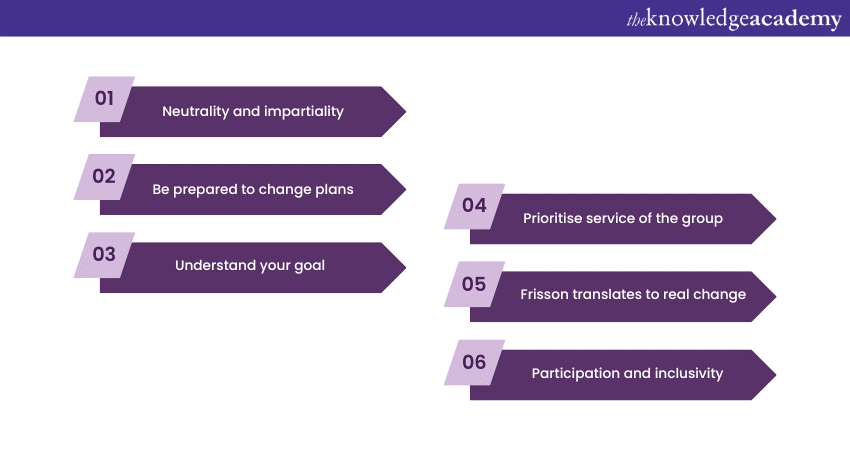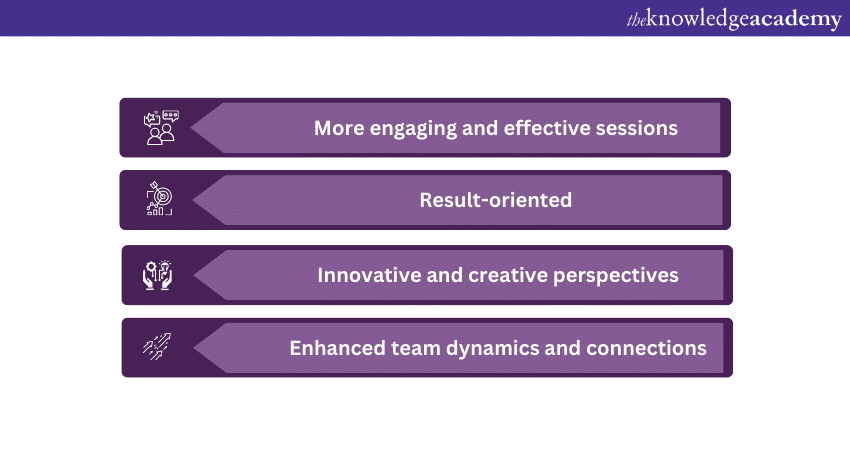We may not have the course you’re looking for. If you enquire or give us a call on +1800812339 and speak to our training experts, we may still be able to help with your training requirements.
Training Outcomes Within Your Budget!
We ensure quality, budget-alignment, and timely delivery by our expert instructors.

Facilitation is the structured process of optimising a group’s dynamics in terms of its interactions and drive towards achieving its outcomes. Understanding What is Facilitation helps a team leverage their team bonds and workflow with the help of a multi-faceted process. This process is pivotal in many settings that involve collaboration.
Now, more importantly, Facilitation requires guiding a group, encouraging participation and ensuring the focus on fulfilling objectives. Keeping up with modern working environments, it is vital to learn What is Facilitation and its benefits in various contexts, from business meetings to community gatherings.
Table of Contents
1) An introduction to What is Facilitation
2) Exploring the principles of Facilitation
3) Looking at the benefits of Facilitation
4) Examples of applied Facilitation
5) Conclusion
An introduction to What is Facilitation
Facilitation is a term generally heard in business meetings or group discussions and is still not fully understood by many. The Definition of Facilitation is basically the process of making tasks easier and more manageable.
Now in the context of group activities, Facilitation refers to the methods and strategies employed to ensure smooth, effective, and efficient communication. The facilitator is the key player in this process, guiding the group towards achieving a common goal while ensuring that each member's thoughts and ideas are heard and considered.
Furthermore, the process of Facilitation serves as the backbone of successful team collaborations, paving the way for informed decision-making, inclusive participation, and the seamless execution of group tasks.
Moreover, Facilitation helps foster a safe environment that is conducive for participants to express their opinions without inhibitions of being ignored or overshadowed. The process enhances individual productivity by keeping discussions goal-oriented and focused. These measures thereby reduce the instances of any ideas that may deviate from the original goal, leading to inefficient usage of time.
Exploring the principles of Facilitation
The principles of Facilitation revolve around the creation of an inclusive, respectful and participatory environment. The key principles of Facilitation are described in detail as follows:

Neutrality and impartiality
Neutrality and impartiality are two concepts that are interconnected and integral to fair decision-making processes and conflict resolution and are also fundamental in roles such as mediation and Facilitation.
Additionally, neutrality refers to the state of not supporting or favouring any side in a conflict or disagreement. The neutral party does not have a personal interest in the outcome of a decision or discussion and refrains from taking sides. The impartiality allows them to focus on the process, ensuring it's fair and unbiased.
More importantly, impartiality is the principle of treating all disputants equally without prejudice or bias. An impartial person does not allow their personal feelings, opinions, or preferences to influence their judgement. This, however, doesn't mean they don't have personal beliefs or biases, but they must be able to set these aside to provide equal opportunities to all parties involved.
Therefore, a facilitator must demonstrate both neutrality and impartiality. They must not favour any participant or idea, treating all participants with equal respect and consideration. This allows for an open and inclusive environment where everyone feels their opinions are valued, fostering effective communication and collaboration.
Be prepared to change plans
The ability to be dynamic with plans is a principle that emphasises adaptability and flexibility, which is particularly important in Facilitation, project management, and leadership roles. It recognises that despite thorough planning and strategising, circumstances can shift unpredictably, requiring adjustments to be made to initial plans.
What this means is to maintain an open and receptive mindset to new information, changing dynamics, or unexpected occurrences that can disrupt original intentions. It involves continuously assessing the situation and the progress towards objectives and being willing to modify the course of action when needed.
More importantly, this doesn't signify a failure of initial planning but rather an agile response to the unpredictable nature of group dynamics, market forces, or even world events. The ability to pivot when necessary is a sign of strong leadership and effective management.
However, changing plans should not be done on impulse or without consideration. It should ideally involve a careful assessment of the new circumstances, evaluating alternative paths, and deciding on the most appropriate course of action. This includes clear communication with all involved parties about the changes and the reasons behind them.
Motivate your team and improve performance by signing up for the Successful People Management and Team Leadership course now!
Understand your goal
A well-articulated goal acts as a compass, pointing you in the right direction and keeping you aligned with your desired outcome. Understanding your goal isn't just about knowing what you want to achieve. It involves an in-depth appreciation of the why behind your goal.
Additionally, this understanding provides motivation, gives meaning to your efforts and helps you remain focused, especially in challenging times.
In the context of Facilitation, understanding your goal means knowing the purpose of the meeting, workshop, or session you're facilitating. It could be to brainstorm new ideas, to resolve a conflict, or to make a crucial decision. The objective should guide the design of the Facilitation process, including the activities, discussions, and techniques employed.
Now, once the goal is clear, it's easier to measure progress and success. Without understanding your goal, you may end up wasting resources on irrelevant tasks or drifting off course. Therefore, whether you're a facilitator guiding a group, a leader defining a vision, or an individual charting your life path, understanding your goal is the crucial first step towards success.
Prioritise service of the group
Prioritising the service to a group is a fundamental principle in Facilitation and leadership. It underscores the importance of placing the needs and objectives of the group above personal interests or agendas. This is especially critical in a facilitator's role, where their primary duty is to guide the group towards achieving a common goal.
Additionally, it involves ensuring fair and equal participation, fostering open communication, and addressing any conflicts in a constructive manner. The facilitator's focus should be on enabling the group to work together effectively rather than directing or influencing the outcomes.
Furthermore, this principle also highlights the need for a facilitator to remain neutral and impartial. They should avoid showing favouritism or bias towards any member or idea, instead promoting a balanced and inclusive discussion.
Frisson translates to real change
The translation of frisson to real change is a principle that conveys the idea that moments of intense emotion or excitement can lead to significant transformation. 'Frisson' is a French term often used in English to describe a sudden, passing sensation of excitement or thrill, usually accompanied by a shiver or goosebumps. With respect to Facilitation, it could refer to those pivotal moments in a discussion or a breakthrough in understanding, leading to substantial shifts in perspective or behaviour.
Furthermore, these moments of frisson could be the result of a compelling idea, a powerful story, or an unexpected revelation. They act as catalysts, breaking through periods of stagnation or resistance and igniting the team’s collective momentum towards change.
More importantly, when harnessed effectively, the moments of transformation can foster more meaningful connections, inspire innovative thinking and drive change within individual members and the group.
Participation and inclusivity
Participation and inclusivity are foundational principles in any collaborative setting, particularly in Facilitation. They underscore the importance of involving every member of the group and ensuring that everyone feels valued, heard, and included.
Now, participation is the active involvement of all members of the group in discussions and processes that involve decision-making. It implies not just physical presence, but also intellectual and emotional engagement. A high level of participation ensures that a wide range of ideas and perspectives are shared, leading to better decisions and solutions.
Moreover, inclusivity focuses on the creation of an environment where all team members are welcomed and valued regardless of their backgrounds, beliefs, or perspectives. Inclusivity demands the acknowledgement and respect of the group’s diversity, ensuring that everyone has the opportunity to contribute equally.
More importantly, it is the facilitator's role to promote both participation and inclusivity. This might involve setting ground rules for respectful dialogue, actively encouraging quieter members to speak up, and ensuring that the process is fair and unbiased.
Manage conflicts effectively to maintain your team’s dynamic by signing up for the Conflict Management Training now!
Looking at the benefits of Facilitation
Facilitation can greatly benefit a team and its members by encouraging effective communication and collaboration and driving momentum for consensus. The process ensures that every member’s voice is heard and valued, improving inclusivity and engagement in discussions. Here are the many benefits of Facilitation, described in the list below as follows:

More engaging and effective sessions
Facilitation plays a crucial role in making sessions more engaging and effective. A skilled facilitator knows how to spark and sustain interest, ensuring that participants remain focused and invested throughout the session.
Additionally, they use a variety of methods and techniques to keep the conversation flowing and to ensure active participation. This might involve icebreakers, group activities, brainstorming sessions, or interactive presentations that capture attention and encourage interaction.
Result-oriented
Facilitation plays a pivotal role in driving sessions towards achieving the team’s desired results. The crux of Facilitation is in its ability to guide a group towards a common objective, keeping the focus on the end goal while fostering an environment conducive to productive discussions.
Furthermore, a facilitator provides structure to a session, ensuring that the process is clearly defined and all participants understand the objectives. They maintain a clear vision of the outcome, guiding discussions and activities to align with the set goals.
Innovative and creative perspectives
Facilitation is instrumental in fostering innovative and creative perspectives within a group. Through its focus on inclusivity and active participation, it fosters an environment that encourages the sharing of diverse ideas and viewpoints.
Additionally, a skilled facilitator knows how to spark creativity among participants. They might use brainstorming sessions, problem-solving exercises, or thought-provoking questions to stimulate innovative thinking. They challenge participants to think beyond their usual perspectives and explore new possibilities.
Enhanced team dynamics and connections
Facilitation plays a vital role in enhancing a team's dynamic and strengthening connections among its members. Through a well-facilitated session, members can better understand each other's viewpoints, work more collaboratively, and build stronger relationships.
Now, a seasoned facilitator has the ability to foster an environment of open communication, encouraging team members to freely express their ideas and opinions. This openness enhances understanding and reduces miscommunication, leading to better team dynamics.
Improve your relationships through effective communication by signing up for the Effective Communication Skills course now!
Examples of applied Facilitation
Here are some examples of the situations where the Facilitation process can be applied:
Workshops
Facilitation is often utilised in workshops to ensure they are productive, inclusive, and outcome-focused. A facilitator plans the workshop around clear objectives, outlining activities that engage participants and foster learning. They may also use techniques such as brainstorming, group discussions, role-playing, or problem-solving exercises to encourage active participation.
More importantly, the facilitator ensures all voices are heard, promoting an environment of inclusivity and respect. They guide the conversation, keeping it focused on the objectives, and intervene when necessary to manage conflicts or maintain momentum. Through effective Facilitation, workshops can result in meaningful learning, innovative ideas, and actionable outcomes.
Educational settings
In educational settings, Facilitation serves as a powerful tool to promote active learning, critical thinking, and collaboration among students. Instead of a traditional lecture-style approach, facilitators guide students towards self-discovery and knowledge construction. They might use techniques such as group discussions, project-based learning, or peer teaching to foster student engagement.
Furthermore, facilitators also encourage inclusive participation, ensuring every student feels valued and heard. Moreover, they support students in resolving conflicts constructively and collaboratively.
Moreover, these practices cultivate a positive learning environment, deepen understanding, and foster vital skills like problem-solving and teamwork. Therefore, Facilitation transforms the learning process into a dynamic, student-centred experience.
Manage your remote team faster and better by signing up for the Managing Remote Teams course now!
Remote collaboration
In the context of remote collaboration, Facilitation plays a crucial role in ensuring effective communication, participation, and productivity. Facilitators use digital tools to orchestrate meetings or workshops, employing techniques like virtual brainstorming, breakout rooms, and digital polling to encourage active engagement.
Additionally, they manage online etiquette, ensuring respectful interactions and balanced participation, and adapt their methods to overcome challenges of remote communication, like misunderstandings or technical glitches. They also set clear expectations for remote conduct, reinforcing the importance of timely responses and accountability.
Moreover, with Facilitation, remote teams can effectively collaborate, fostering a shared understanding and achieving common goals despite geographical distances.
Conclusion
You have now understood the depth behind What is Facilitation. The process is a multifaceted one that fosters inclusivity, collaboration, effective communication and goal-oriented results. It is mainly a tool that enhances creativity, fosters engagement in the team and drives meaningful outcomes.
Assist individuals and groups to collaborate effectively, by signing up for our Facilitation Skills Training now!
Frequently Asked Questions
Upcoming Business Skills Resources Batches & Dates
Date
 Facilitation Skills Training
Facilitation Skills Training
Fri 10th Jan 2025
Fri 28th Feb 2025
Fri 4th Apr 2025
Fri 16th May 2025
Fri 11th Jul 2025
Fri 19th Sep 2025
Fri 21st Nov 2025







 Top Rated Course
Top Rated Course



 If you wish to make any changes to your course, please
If you wish to make any changes to your course, please


